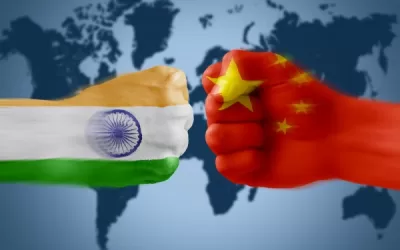Last updated September 27th, 2024.
You’ve almost surely traded stocks in your home country before. Yet investing in Asia and becoming part of the continent’s ongoing growth story now makes sense more than ever.
The center of international power is undoubtedly shifting eastward. Four billion people, over half the world’s population, currently live on the Asian continent.
In other words, investing in Asia means investing in the bulk of humanity.
Meanwhile, economic growth rates in places like India and Vietnam far surpass anywhere else in the western world.
Growth potential in these countries are based on internal growth factors moreso than the whims of the global economy.
Demographic factors like a low average age, growing middle class, and rising urbanization rate practically necessitate greater demand for housing and consumer products over time. This directly translates into higher real estate and equity prices.
Compare all that to the western world which is, generally speaking, suffering through flat GDP growth alongside rising debt levels and terminal population decline.
Simply put, real estate and stock investors alike must start searching across the globe in order to give themselves the biggest chance for success during the 21st century.
Below, we’ll tell you why international investing is a crucial part of any modern portfolio… and how you can start buying assets around the world.
International Investing = Better Diversification
One main reason why you should buy foreign stocks and real estate is because of their diversification benefits.
After all, diversifying your portfolio and protecting your assets is equally as important as making money.
You can increase a portfolio’s diversification and lower several types of risk, including country risk and systemic risk, through buying international real estate and equities.
Instead of relying on just a single country’s growth, you will spread your economic and political risk across the world. The same is true for currency risk when you buy stocks denominated in a different currency than your own.
Every investor knows that putting all your money in a single stock is extremely risky. Fewer people understand that, for similar reasons, investing in one country is almost as risky though.
You can greatly diversify your portfolio while raising the chances of long-term growth through buying international stocks.
Global Markets Give You Greater Flexibility
Investors truly thrive when they have a greater amount of flexibility. The ability to trade stocks globally instead of simply in your own market is a huge advantage.
Tens of thousands of publicly traded companies exist in the world. Some of these stocks are fantastic buys.
Yet they’re unavailable to anyone who doesn’t have a brokerage account that’s able to access the country they’re traded in.

Singapore is a leading wealth management hub and is home to several of Asia’s most stable banks. You can find companies from all over the world, including those based in China, Thailand, and Australia, listed on Singapore’s stock exchange.
If you can quickly react to global news, you will enjoy far greater flexibility. Local events can be incredibly profitable for investors, but only if they can access the local stock exchange.
In a hypothetical scenario, let’s imagine that a massive oil field was found off the coast of Indonesia.
Not many brokers based in western countries allow you to trade stocks in Indonesia. Yet by having a suitable brokerage account already in place, you could immediately react and buy assets that would benefit most from such news.
Many Pros, Few Cons for Offshore Investors
Difficulties still remain when it comes to investing in Asia – or for that matter, any other region in the world if you aren’t living there.
Lots of these problems are related to foreign investors not being able to easily navigate markets outside of their home country.
Generally, foreign stock market information is only available in a different language than your own.
You’ll have a very hard time analyzing stocks listed in China if you only speak English, for example.
Meanwhile, the complex process of setting up offshore brokerage and bank accounts can often deter would-be investors entirely.
But while there’s a rather steep learning curve when it comes to investing internationally, the positives far outweigh the negatives if you’re willing to put forth time and effort.
Frontier markets like Vietnam, Cambodia, and the Philippines are among our favorite places to invest in.
Their lack of correlation with the world economy helps multiply the advantages that global investing offers you in the first place.
FAQs: International Investment
Why Should I Invest Internationally?
One of the primary advantages is improved diversification, which helps protect your assets and reduce various types of risks. By spreading your investments across different countries, you're not relying on the economic performance of a single nation, thus mitigating country-specific and systemic risks.
Moreover, international investing provides access to a vast array of opportunities that may not be available in your home market. With thousands of publicly traded companies worldwide, you can tap into high-growth markets and potentially achieve better returns. Many Asian economies, for instance, are experiencing rapid growth rates that far surpass those of Western markets.
Another key benefit is the flexibility that comes with global investing. Having the ability to react quickly to local events and market shifts can be a significant advantage for savvy investors.
Additionally, by holding assets in different currencies, you can protect yourself against fluctuations in your home currency, further diversifying your portfolio.
What Are the Challenges of Offshore Investment?
While international investing offers numerous advantages, it does come with its fair share of challenges. One of the most significant hurdles is the language barrier. Stock market information in foreign countries is often only available in the local language, making it difficult for non-native speakers to conduct thorough research and analysis.
Cultural differences and unfamiliar business practices can also pose challenges for international investors. Understanding local market dynamics, regulations, and investor sentiment requires time and effort to navigate effectively. Additionally, the process of setting up offshore brokerage and bank accounts can be complex and time-consuming, often deterring investors.
Despite these challenges, the potential benefits of international investing often outweigh the drawbacks for those willing to put in the necessary time and effort. Many investors find that the learning curve, while steep, ultimately leads to valuable insights and opportunities.
Are There Any Particularly Attractive Markets?
Several Asian markets stand out as particularly attractive options for international investors. Frontier markets like Vietnam, Cambodia, and the Philippines offer high growth potential and low correlation with the global economy, making them excellent choices for portfolio diversification. These markets often have unique economic drivers that can provide resilience during global downturns.
Singapore is another noteworthy destination for international investors. As a leading wealth management hub with a stable banking system, Singapore offers access to companies from across Asia and beyond. Its well-regulated market and strong currency make it an attractive option for those seeking a balance between growth potential and stability.
How Can Global Investing Protect My Portfolio?
International investing, particularly in certain markets, can serve as a valuable hedge against global economic crises. One of the key advantages is the ability to diversify across multiple countries and currencies, which can help mitigate the impact of any single market's downturn on your overall portfolio. This geographical diversification can provide a buffer against localized economic shocks.
Frontier markets often have less dependence on global economic trends, potentially offering protection during worldwide recessions. For example, countries like Laos and Cambodia, which are less integrated into the global economy, may continue to grow even when developed markets are struggling. This lack of correlation with the world economy can be a valuable asset in times of global uncertainty.
Additionally, investing in countries with strong internal growth factors, such as young populations and rising urbanization rates, can provide resilience against global economic fluctuations.







